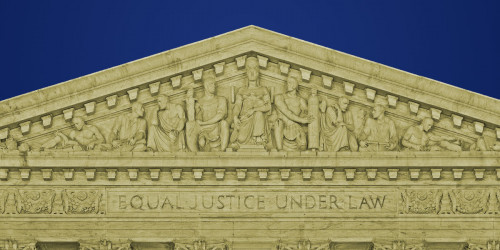The Santa Barbara News-Press needs a lesson in the First Amendment. Insisting that an anonymous comment posted for a few hours on a news blog skewed a labor unionization vote, the publisher of the newspaper is demanding that Google disclose the blogger's account information.
It all started last September. Three months after several editors walked off the job amid allegations that News-Press owner and co-publisher Wendy McCaw had improperly interfered in editorial decisions, the employees that remained were struggling to form a union to negotiate with McCaw. McCaw did not take kindly to the unionization effort or even commentary about it--in fact, she has sued two newspapers based on their coverage of the labor dispute and threatened defamation suits against individual citizens who posted pro-union signs in their windows. The legal campaign has made headlines around the country.
Enter pseudonymous blogger Sara de la Guerra. Sara reports and comments on current events in Santa Barbara and has been critical of McCaw's anti-union tactics. In early September, a third party submitted a comment advocating various acts of cybersabotage against News-Press management. The comment was taken down within hours, but News-Press later issued a press release quoting and complaining about the comment.
When the employees then voted to form a union, News-Press filed objections with the National Labor Relations Board, arguing that the comment had influenced the election. Three months later, just a few days before the hearing on the objections, News-Press issued a subpoena to Google seeking information relating to Sara's account.
News-Press has apparently forgotten a basic principle of the journalistic profession--respect for the First Amendment, which protects the right to anonymous speech. Court after court has recognized that discovery requests that seek to pierce the anonymity of online speakers must be carefully scrutinized in order to prevent the improper use of the discovery process to unmask anonymous speakers. Moreover, courts have recognized the need for a particularly high level of protection when the discovery request seeks information about a nonparty.
Such protection seems especially important here, given McCaw's proclivity for retailiating against critics. Sara's important but fragile anonymity interests must be shielded unless News-Press can show that its claims are viable and that the requested evidence is necessary to advance those claims.
And therein lies the rub: The hearing to which the information would be relevant was held last week, with no reference to the subpoena. Thus, even assuming the information was relevant to some claim, the need for that information has passed.
EFF has written a letter to the NLRB judge explaining the free speech interests at stake and asking him to confirm the subpoena is moot. Here's hoping that the judge will bring a quick end to this dangerous skirmish in the News-Press' anti-union campaign.
UPDATE: After the judge confirmed that any subpoena issued in this matter pertained solely to the production and use of documents at the January 9-10 representation hearing, which is now closed, Google decided not to produce the requested information. Working with the Stanford Center for the Internet and Society, Sara de la Guerra managed to persuade another subpoena recipient, Verizon, to follow suit.
This week, the hearing judge issued a lengthy decision rejecting Ampersand's claims. The judge specifically found that the anonymous comment did not influence the election. Details about the decision are available on BlogaBarbara We're pleased that Sara's anonymity did not have to be sacrificed in the name of the News-Press' misguided effort to overturn a legitimate union election.
Unfortunately, the News-Press hasn't learned its lesson: last week it issued another subpoena to Google, in connection with yet another employment dispute, but this time seeking the identity of an anonymous commenter rather than Sara de la Guerra. Google has given Sara a chance to get the word out to the commenter and Sara has done so via her blog. Unfortunately, if the commenter doesn't learn of the subpoena and move quickly to protect his or her anonymity, the News-Press may succeed in this new effort to thwart the First Amendment.










